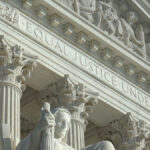The U.S. Supreme Court overturned the infamous 1984 Chevron decision this morning, declaring that from now on, judges in cases that involve administrative agencies should exercise their own independent judgment instead of rubber-stamping the ideas of unelected bureaucrats. That decision marks an important step toward making government agencies more accountable both to the law and to the American people. It also brings federal law more into line with developments in state law, which as the Goldwater Institute pointed out in its brief in today’s case, has been moving away from the Chevron precedent in recent years.
The idea behind Chevron was that if Congress passes a law and creates an agency to enforce that law, the agency is free to interpret what that law means—and courts will “defer” to that interpretation, meaning that judges will accept those interpretations in almost every instance. The Chevron rule was supposed to serve the goals of “judicial restraint”—and it did, but it did so only by effectively expanding the power of agencies and the unelected officials who serve in them.
Take, for example, the Clean Water Act, which makes it illegal to “discharge” a “pollutant” into a “water of the United States.” What do those terms mean? Under the Chevron rule, those terms meant basically whatever Environmental Protection Agency (EPA) bureaucrats said they mean. And as a result, the EPA began declaring basically anything to be a “pollutant,” or a “discharge,” or a “water of the United States.” They even declared perfectly dry land to be a “water of the United States” in some cases, or declared that the soil that was already in a riverbed was a “pollutant” in the river. And if a person was charged with violating the law, and went to court to challenge the agency’s interpretation of these terms, Chevron required that the judge “defer”—that is, accept—the EPA’s definitions, despite the fact that judges, not agencies, are the ones the Constitution entrusts with the job of defining legal terms.
Under Chevron, administrative agency power expanded enormously. As Justice Neil Gorsuch observes in his concurring opinion today, “Chevron deference requires courts to place a ‘finger on the scales of justice in favor of the most powerful of litigants, the federal government’…[and] guarantees ‘systematic bias’ in favor of whichever political party currently holds the levers of executive power…. Because the reasonable bureaucrat may change his mind year-to-year and election-to-election, the people can never know with certainty what new ‘interpretations’ might be used against them. This ‘fluid’ approach to statutory interpretation is ‘as much a trap for the innocent as the ancient laws of Caligula,’ which were posted so high up on the walls and in print so small that ordinary people could never be sure what they required.”
Today’s decision reflects a growing worry about the unaccountable and undemocratic power of these agencies, which are not subject to the power of voters. That worry is non-partisan, and it has led several states, including Arizona, to abolish their own state analogues to Chevron deference. Thanks to reforms pioneered by the Goldwater Institute, Arizona abolished its state-level Chevron rule in 2018 by adopting a statute that entitles people to a fair and unbiased hearing before a judge when challenging a bureaucracy’s decisions. Tennessee followed suit shortly after, and other states, including Wisconsin and Mississippi, abolished their state-level Chevron rule by judicial decision.
As we explained in our brief to the Supreme Court, this has not led to any kind of chaos at the state level—states are still able to enforce laws against pollution and other problems. But it has at least leveled the playing field so that citizens aren’t confronted with the “systematic bias” Justice Gorsuch described.
Today’s ruling brings federal law into line with the state’s lead. It’s a welcome step toward restoring accountability to government officials who are, after all, supposed to be our employees, not our bosses. Chevron, writes Justice Gorsuch, “represents a grave anomaly when viewed against the sweep of historic judicial practice. The decision undermines core rule-of-law values ranging from the promise of fair notice to the promise of a fair hearing. Even on its own terms, it has proved unworkable and operated to undermine rather than advance reliance interests, often to the detriment of ordinary Americans.” Now is the time for more states to take up the charge of restoring accountability, rationality, and the rule of law across America.
Timothy Sandefur is the Vice President for Legal Affairs at the Goldwater Institute.










